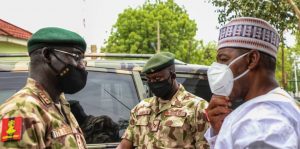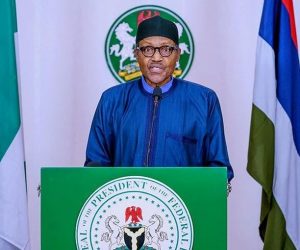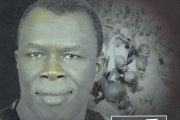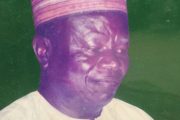Nigeria’s 60th Independence Anniversary is all but gone without any game changer of a pronouncement from any quarter in terms of a how a country suffering from acute arrested development might get out of it. Embattled governor of Borno State, Babagana Zulum did make a statement in seeking the invitation of Chadian troops to help the Nigerian Army crush Boko Haram insurgency. It is an understandable statement from him after surviving several attacks on his convoy by Boko Haram elements. Still, what he said is a commentary on Nigeria’s degeneration to nonentity rather than the kind of framing of the crisis badly needed. In any case, it is not his job to lead the discursive onslaught on the Nigerian crisis. The president is the one on whom all eyes are fixed when it comes to leadership of that sort of discourses.
 Of course, President Buhari made a national broadcast. He spoke well but only if that speech were being delivered on October 1st, 2015. It was a re-assurance speech, not a speech after six years in the saddle.
Of course, President Buhari made a national broadcast. He spoke well but only if that speech were being delivered on October 1st, 2015. It was a re-assurance speech, not a speech after six years in the saddle.
The speech is locating the source of the problems afflicting the nation in popular willingness even after the president claimed in the very first paragraph that the people willingly gave him that collective approval for wide-ranging social re-ordering of Nigeria. Why task the same population with the same challenges you advanced to be recognised as the Messiah in terms of the solution?
There is no argument about it that the Nigerian society is full of criminal, corrupt and uncivil elements. But the president’s problems are not because he is taking on those sorts of people. Rather, the president’s problems are, by common agreement, emanating from peculiar personal propensities, (the triple Ps of President Buhari). It can be summarised by calling it obsession with a binary view of social reality that disable him from overcoming his blinkers. Nobody could have anticipated that dimension until the president mounted the saddle.
Even now that he has placed the people at the centre of change, there is no reference throughout the address to any mass mobilisation campaign and along which lines towards a critique of what exists.
So many other contradictions can be found spread all over the speech. In fact, it could be concluded that whoever drafted the speech did so out of contempt for everyone and even for the president.
Nowhere might this have been most manifest than paragraph 11 (eleven) where the president’s list of the roadblocks on the journey was the truncation of democracy by one of the rounds of military intervention in politics. But it was the same Buhari who was the military Head of State in the aftermath of the coup.
Or the point about tracing underlying cause of most of the problems in Nigeria to “consistent harping on artificially contrived fault-lines that we have harboured and allowed unnecessarily to fester”. Only someone suffering from absolutist foundationalism about his statistics of ethno-regional and religious distribution of government appointments in the country can say this at a time so many have concluded that the president himself is the sole origin of the crisis today via his pattern of appointments.

President Buhari
What stops a president who wants to be believed from releasing the statistics so that everyone can see that the charge of nepotism is untrue? It is either there is no such statistics and the president is actually guilty of nepotism or he is up to a hidden agenda.
“We need to begin a sincere process of national healing and this anniversary presents a genuine opportunity to eliminate old and outworn perceptions that are always put to test in the lie they always are”
By sentences such as these, it is easy to see that the speech writer thinks the word ‘lie’ has one universal meaning irrespective of time and space. It refers us to the other dimension of the Buhari government – the obvious lack of epistemic weight to move a complex society such as Nigeria. Nigeria is complex not necessarily in terms of ethnic diversity but in its combustible combination of a largely pre-industrial population hooked on theological self-conceptions but balancing delicately on modernist lenses. This makes Nigeria twenty times more complex than any European society to manage.
The problem in Nigeria is the leadership requirement for managing this complexity is never a part of the criteria for leadership recruitment. Instead of such consideration, the fears of a tiny but the most powerful segment of the elite determines who can become president. Six months after the inauguration of every new president, the honeymoon is over and the permanent stalemate begins. In the end, another eight years would have been wasted.
Neither the masses nor the middle class can do anything about this because their own criteria of a good material does not even extend beyond the beatification of who the big players choose for them to formally endorse at ritualistic elections. In the end, it can only be said that a society gets the leadership it deserves.




























